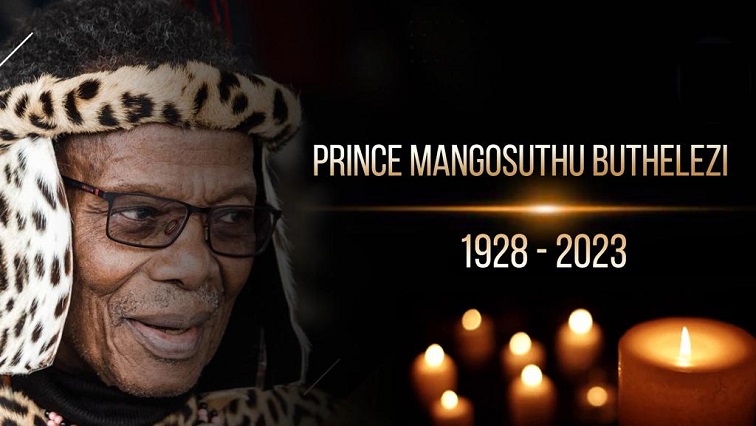Prince Mangosuthu Buthelezi, the amaZulu Traditional Prime Minister to the Zulu Nation and Inkatha Freedom Party (IFP) President Emeritus, has passed away at the age of 95.
President Cyril Ramaphosa confirmed the passing which occurred in the early hours of Saturday morning
He held the distinction of being the longest-serving AmaZulu Traditional Prime Minister, serving under three successive Zulu kings, beginning with King Cyprian Bhekuzulu. He also played a pivotal role in facilitating the ascension of King Misuzulu kaZwelithini to the throne.
Prince Mangosuthu Buthulezi was born on 27 August 1928, in Mahlabatini in Kwazulu-Natal. He is the Traditional Prime Minister of the Zulu nation and a member of the South African parliament and he is best known as the founder of the Inkatha Freedom Party (IFP).
Royal Heritage
His parents were Chief Mathole Buthelezi and Princess Magogo kaDinuzulu, daughter of King Solomon kaDinuzulu. He is therefore a direct descendant of King Shaka, the founder of the Zulu nation, through his mother. His great grandfather on his father’s side was Chief Mnyamana Buthelezi, Prime Minister to King Cetshwayo.
TIMELINE:
Student Life
In his student days Buthelezi’s political roots were firmly planted in the ANC when he joined the youth league.
He worked with prominent leaders of the struggle, Pixley ka Isaka Seme and Albert Luthuli, and had good relations with young leaders of the movement such as Oliver Tambo and Nelson Mandela.
In the late 1960s Buthelezi controversially decided to fight the apartheid system from within.
A move he always maintained was approved by the ANC.
In 1976 Inkosi Buthelezi became chief minister of the KwaZulu self-governing territory, after formally rejecting the homeland system.
He said the system was imposed on them by law.
But his detractors accused him of being an apartheid collaborator.
The emergence of the black consciousness movement which totally rejected this idea that you could cooperate with the system and work within the system but also try to destroy it and as a result of the rise of the black consciousness movement there was a generally accepted, especially among the youth of the idea that the struggle meant no cooperation at all with the system of apartheid. And I think that then causes the friction and the conflict between Buthelezi and the rest of the liberation movement.
By the late 1970s, it’s claimed that Inkatha Yenkululeko Yesizwe, the cultural organisation earlier revived by Inkosi Buthelezi, had about a million card-carrying members.
The organisation, later to be named the Inkatha Freedom party, was according to Buthelezi, started with the consent of Tambo. The ANC in exile was said to have then tried to convince Inkatha to join the armed struggle. Buthelezi said he met the ANC in London in 1979 where he rejected the policy of sanctions and the armed struggle.
His relationship with the ANC started to deteriorate.
Buthelezi, depended on the apartheid state, was thought a puppet of the regime, and was criticised for pushing an agenda of tribal loyalties and ethnic interests above national unity.
Editor Sunday Times S’thembiso Msomi says, “So the legacy becomes complex because in KZN when young people started to take on institutions of state it meant also taking on institutions that were under Buthelezi’s rule and as a result it led to that conflict where he then finds himself in a struggle against other liberation movements instead of the struggle everything was feigning towards a common goal which was to end apartheid.”
But it led to a period of deadly political violence between ANC and IFP supporters in the mid-1980s to early 1990s.
Denying that he ever sanctioned violence, Buthelezi later would say that the violence occurred largely because of what he termed the “ANC’s people’s war”.
During this time members of the IFP received para-military training by the then defence force… which were later accused of several acts of atrocities.
Buthelezi always contended that IFP supporters were defending themselves against trained MK operatives.


